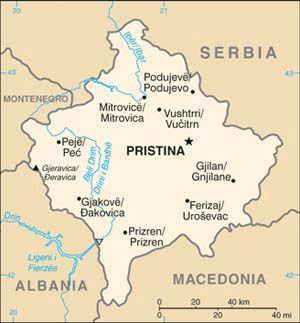Kosovo Police Clashes With Protesters
By Fatmir Aliu
Eighteen police officers and 10 activists from Vetevendosje, the Kosovan opposition party, have been injured during a protest against the Kosovo – Serbia talks.
The protests in Pristina’s Mother Teresa square are continuing, and large numbers of police reinforcements have been brought in to protect the security perimeter.

The protesters are refusing to leave, and have all sat down. The police have issued warnings to the protesters that they should leave or be arrested. According to the police 26 people were arrested so far.
Over one hundred activists from the opposition Self-Determination Movement, Vetevendosje, gathered at 8am this morning in Pristina’s Mother Teresa square, near the parliament building, to voice their objections to the talks Kosovo’s Prime Minister Hashim Thaci conducted with his Serbian counterpart Ivica Dacic on Friday.
The situation escalated when the police confronted the demonstrators as they tried to breach the security perimeter set put around the government building, pelting the police with white paint, rotten tomatoes and rocks.
Using pepper spray and tear gas, the Kosovo police pushed the protesters away from the building and started arresting them.
“At least 10 protesters have asked for medical treatment at the hospital, ” Basri Lenjani, the Emergency Centre Director, told Balkan Insight.
The police say that 18 officers were injured, and have accused the Vetevendosje of staging a ‘violent protest’, which has resulted in the detention of 26 people. Because the protest was unannounced, the police have deemed the protest illegal.
There were Members of Parliament among those arrested, but they were later released after they were identified.
Vetevendosje says that one of its MPs, Liburn Aliu, was badly beaten by the police after his detention. It also claims that three other lawmakers, Glauk Konjufca, Visar Ymeri and Anita Shabani were also badly treated.
